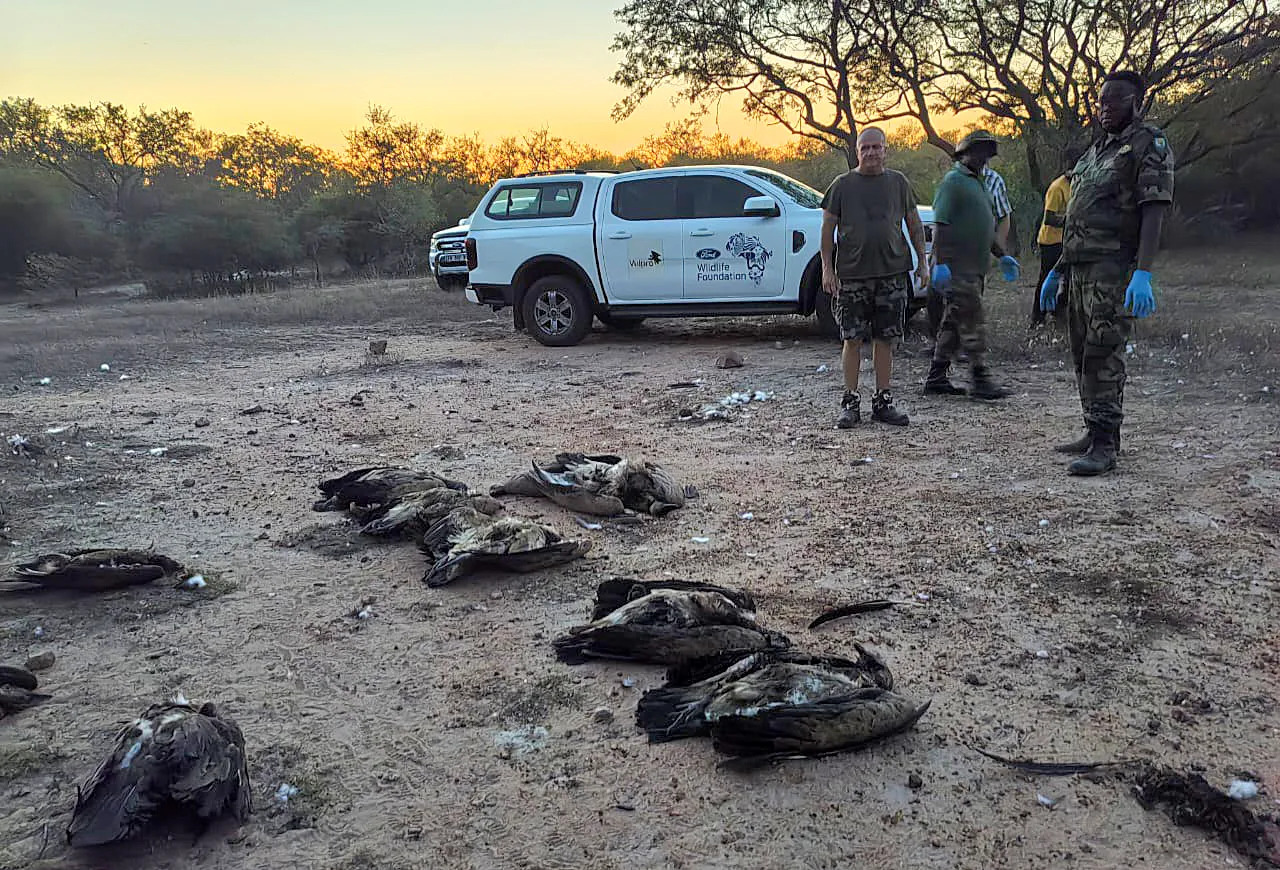In Guinea-Bissau, a man was sentenced to four years and two months in prison for poisoning and killing 50 Hooded Vultures (Necrosyrtes monachus). This is the first conviction for an environmental crime in Guinea-Bissau, making it an unprecedented victory “that will serve as a reference for other species and even for illegal logging”, said Francisco Wambar, Director of the Organisation for the Defence and Development of Wetlands (ODZH).
Among the West African countries, Guinea-Bissau is home to the largest population of the Critically Endangered Hooded Vulture. Unfortunately, in 2020 and 2021, thousands of vultures were killed in the country, hindering the conservation status of the species, threatened with extinction in Africa.

Man convicted for mass poisoning, the first environmental crime conviction in Guinea-Bissau
Back in 2020, 2000 Hooded Vultures were poisoned to death in Guinea-Bissau, the biggest vulture killing ever recorded in history in the world. One year later, another 50 Hooded Vulture carcasses were found and by mid-2022, the estimated number of vultures killed in Guinea-Bissau reached 2,262. The main incidents occurred in the regions of Bafatá, Gabú, in the East, and Canchungo, in the north, where the man was sentenced.
The man was blow whistled by the local community of Popal, and charged guilty of mass poisoning, by the Northern Regional Court in Bissorã. Apart from imprisonment, he was also sentenced to a fine of 900,000 CFA francs (about 1,372 euros) and the payment of court costs.

Belief-based vulture killing in Guinea-Bissau
The convicted man, originally from Guinea-Conakry, used poison to kill the animals and removed their heads and feet to sell on the black market in Senegal, said Francisco Wambar. Some communities falsely believe that those vulture body parts have powers and use them in black magic.
The illegal trade of vulture parts in Africa accounts for 29% of reported vulture deaths. Several communities consider the heads of Hooded Vultures as good luck charms, making the species among the most traded for belief-based use, and as they become rarer due to this harmful practice, the prices are also rising.
Poison is the biggest threat to vultures in Africa
Unfortunately, mass poisonings of vultures in Africa are successive and frequent, driving several African vulture species to the edge of extinction. In the past 30 years, some African species have declined by 80%. Out of Africa’s 11 vulture species, seven are now on the brink of extinction, with four species considered Critically Endangered and three Endangered. Poisoning events cause a devastating effect on the regional population of species, compromising vultures’ essential function of maintaining healthy and functional ecosystems, and posing a direct threat to other wildlife and public health.
Mass poisoning events have been witnessed in other African countries, recently in South Africa and Botswana, and earlier also in Zululand, Nigeria, Tanzania and Mozambique. The Multi-species action plan to conserve African-Eurasian Vultures (Vulture MsAP), co-developed by the Vulture Conservation Foundation (VCF), and endorsed by the Convention for Migratory Species (CMS), concludes that poison is the biggest threat to vultures worldwide and a significant part of this global action plan for vultures focus on the actions needed to fight this threat.

Fighting wildlife crime: training Guinea-Bissau officials on anti-poisoning response
After the first reports of mass poisoning events in Guinea-Bissau in 2020, VCF and other partners launched a mission to help national authorities to deal with and mitigate further events. In 2022, two very successful workshops were organised in the country, to equip authorities with technical knowledge and tools, and boost vulture conservation at the national level.
“The achievement of the first environmental crime conviction in Guinea-Bissau was also a result of the collaborative efforts and engagement of all stakeholders, from law enforcement to community members. While the anti-poisoning workshop held last year undoubtedly played a critical role in building capacities, it was the collective commitment to justice that made this milestone possible.”
The workshops were also delivered by Andre Botha from the Endangered Wildlife Trust and Isabel Véron from Junta de Andalucia. The first workshop focused on anti-poisoning, and included necropsies and collection of samples, whilst the second set the bases of a national vulture conservation plan in Guinea-Bissau, associated with the Vulture MsAP.

Working together to protect vultures in Guinea-Bissau
The mission engaged with over 50 technicians, including police officers, protected area managers and wardens, veterinarians and NGO staff. Apart from building capacities of national authorities, ODZH is also working directly with the local communities, leading awareness-raising campaigns to encourage the denunciation of environmental crimes.
The workshops were delivered thanks to a joint effort between ODZH and IBAP (the government’s protected areas agency), and were partly funded by the Raptors Memorandum of Understanding (Raptors MoU) within the Convention for Migratory Species (CMS), BirdLife International ,and the VCF, with the endorsement of the IUCN Vulture Specialist Group.
The first environmental crime conviction in Guinea-Bissau is a turning point for wildlife protection in the country. We congratulate the regional court for the given sentence and hope this action can prevent further wildlife crimes in Guinea-Bissau. VCF is committed to further its collaboration with the national authorities and work together for the conservation of Vultures in Africa.




